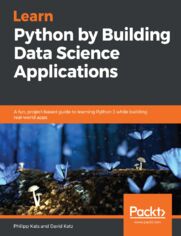Learn Python by Building Data Science Applications - Helion

Tytuł oryginału: Learn Python by Building Data Science Applications
ISBN: 9781789533064
stron: 464, Format: ebook
Data wydania: 2019-08-30
Ksi─Ögarnia: Helion
Cena ksi─ů┼╝ki: 39,90 z┼é (poprzednio: 107,84 z┼é)
Oszczędzasz: 63% (-67,94 zł)
Understand the constructs of the Python programming language and use them to build data science projects
Key Features
- Learn the basics of developing applications with Python and deploy your first data application
- Take your first steps in Python programming by understanding and using data structures, variables, and loops
- Delve into Jupyter, NumPy, Pandas, SciPy, and sklearn to explore the data science ecosystem in Python
Book Description
Python is the most widely used programming language for building data science applications. Complete with step-by-step instructions, this book contains easy-to-follow tutorials to help you learn Python and develop real-world data science projects. The “secret sauce” of the book is its curated list of topics and solutions, put together using a range of real-world projects, covering initial data collection, data analysis, and production.
This Python book starts by taking you through the basics of programming, right from variables and data types to classes and functions. You'll learn how to write idiomatic code and test and debug it, and discover how you can create packages or use the range of built-in ones. You'll also be introduced to the extensive ecosystem of Python data science packages, including NumPy, Pandas, scikit-learn, Altair, and Datashader. Furthermore, you'll be able to perform data analysis, train models, and interpret and communicate the results. Finally, you'll get to grips with structuring and scheduling scripts using Luigi and sharing your machine learning models with the world as a microservice.
By the end of the book, you'll have learned not only how to implement Python in data science projects, but also how to maintain and design them to meet high programming standards.
What you will learn
- Code in Python using Jupyter and VS Code
- Explore the basics of coding – loops, variables, functions, and classes
- Deploy continuous integration with Git, Bash, and DVC
- Get to grips with Pandas, NumPy, and scikit-learn
- Perform data visualization with Matplotlib, Altair, and Datashader
- Create a package out of your code using poetry and test it with PyTest
- Make your machine learning model accessible to anyone with the web API
Who this book is for
If you want to learn Python or data science in a fun and engaging way, this book is for you. You'll also find this book useful if you're a high school student, researcher, analyst, or anyone with little or no coding experience with an interest in the subject and courage to learn, fail, and learn from failing. A basic understanding of how computers work will be useful.
Osoby które kupowały "Learn Python by Building Data Science Applications", wybierały także:
- Think Stats. 3rd Edition 249,17 zł, (29,90 zł -88%)
- Python for Finance. Mastering Data-Driven Finance. 2nd Edition 249,17 zł, (29,90 zł -88%)
- Blueprints for Text Analytics Using Python 230,00 zł, (29,90 zł -87%)
- Practical Statistics for Data Scientists. 50+ Essential Concepts Using R and Python. 2nd Edition 230,00 zł, (29,90 zł -87%)
- Learn Python Programming 285,00 zł, (39,90 zł -86%)
Spis tre┼Ťci
Learn Python by Building Data Science Applications. A fun, project-based guide to learning Python 3 while building real-world apps eBook -- spis tre┼Ťci
- 1. Preparing the workspace
- 2. First Steps in coding variables and data types
- 3. Functions
- 4. Data Structures
- 5. Loops and other compound statements
- 6. First script: Geocoding with Web APIs
- 7. Scraping Data from the Web with Beautiful Soup 4
- 8. Simulation with Classes and inheritance
- 9. Shell, Git, Conda, and More at Your Command
- 10. Python for Data Applications
- 11. Data cleaning and manipulation
- 12. Data Exploration and Visualization
- 13. Training a Machine Learning model
- 14. Improving your Models Metrics pipelines and experiments
- 15. Packaging and testing with poetry and pytest
- 16. Data Pipelines with Luigi
- 17. Lets build a dashboard
- 18. Serving models with Rest API
- 19. Serverless API using Chalice
- 20. Best practices and Python performance





